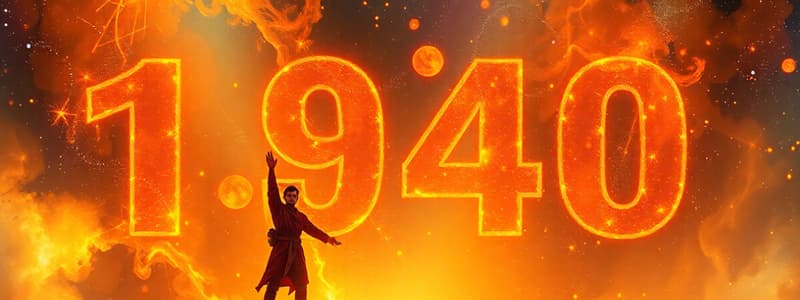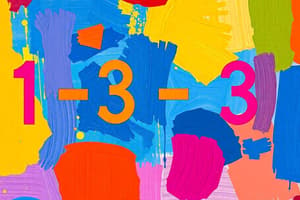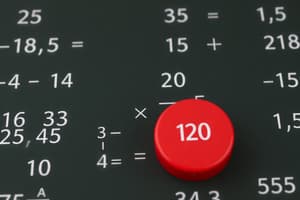Podcast
Questions and Answers
What does the decimal point indicate in a number?
What does the decimal point indicate in a number?
- The start of the decimal places (correct)
- The separation of thousands and hundreds
- The end of the whole number portion
- The value of the whole number
Which of the following represents the value located in the tenths place of a decimal number?
Which of the following represents the value located in the tenths place of a decimal number?
- 1/1000
- 1/100
- 1/10 (correct)
- 1/1
What is the expanded form of 52.73?
What is the expanded form of 52.73?
- 50 + 7 + 2/10 + 3/100
- 50 + 3 + 7/10 + 2/100
- 50 + 2 + 7/100 + 3/10 (correct)
- 50 + 2 + 3/100 + 7/10
What fraction does the hundredths place represent?
What fraction does the hundredths place represent?
How does the place value system work for decimal places in relation to whole numbers?
How does the place value system work for decimal places in relation to whole numbers?
Combining 10 of which decimal place value equals one whole?
Combining 10 of which decimal place value equals one whole?
How are decimal places and fractional values related?
How are decimal places and fractional values related?
Flashcards are hidden until you start studying
Study Notes
Decimal Place Value
- Decimal places are used to represent amounts that are in-between whole amounts.
- Decimal places act as extensions to the base 10 number system which was used for whole numbers.
- Decimal places count PARTS (or FRACTIONS) of things.
Comparing Whole Numbers and Decimal Places
- Whole number places progress to the left of the ones place.
- Decimal places progress to the right of the ones place.
- The decimal point is used as a separator between whole digits and decimal digits.
- The decimal point indicates the beginning of decimal places, counting by tenths, hundredths, thousandths, etc.
Fractional Values and Decimal Places
- The tenths place represents one-tenth (1/10) of a whole.
- The hundredths place represents one-hundredth (1/100) of a whole.
- The thousandths place represents one-thousandth (1/1000) of a whole, and so on.
- Combining 10 of the same decimal place value equals one of the previous place value; e.g., combining 10 tenths equals one whole.
Expanded Form of Decimal Numbers
- The expanded form of a decimal number includes whole number and fractional parts.
- Each digit's value depends on its position.
- For example, the expanded form of 126.53 is: 100 + 20 + 6 + 5/10 + 3/100.
Decimal Place Value
- Decimal places are used to represent amounts less than one.
- Decimal places extend the base-10 number system beyond whole numbers.
- Decimal places represent parts or fractions of a whole.
Comparing Whole Numbers and Decimal Places
- Whole numbers are found to the left of the ones place.
- Decimal places are found to the right of the ones place.
- The decimal point separates whole numbers from decimal values.
- The decimal point marks the start of decimal places, each representing a decreasing fraction of a whole: tenths, hundredths, thousandths, and so on.
Fractional Values and Decimal Places
- The tenths place represents one-tenth (1/10) of a whole.
- The hundredths place represents one-hundredth (1/100) of a whole.
- The thousandths place represents one-thousandth (1/1000) of a whole.
- Each place value is ten times smaller than the one to its left.
Expanded Form of Decimal Numbers
- The expanded form of a decimal number shows the value of each digit.
- Each digit's value depends on its position within the number.
- For example, the expanded form of 126.53 is: 100 + 20 + 6 + 5/10 + 3/100.
Studying That Suits You
Use AI to generate personalized quizzes and flashcards to suit your learning preferences.




